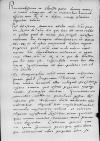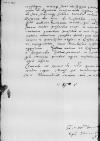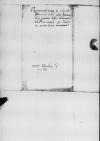Post discessum Mauritius (Moritz), at least in 1537-1547 servant of Ioannes Dantiscus, often sent with letters and packages to the royal court (CIDTC, e.g. IDL 1630, IDL 4476, IDL 3266, IDL 3279)⌊MauritiiMauritius (Moritz), at least in 1537-1547 servant of Ioannes Dantiscus, often sent with letters and packages to the royal court (CIDTC, e.g. IDL 1630, IDL 4476, IDL 3266, IDL 3279)⌋ attulit mihi cf. Ioannes DANTISCUS to Samuel MACIEJOWSKI 1543-11-01 — 1543-11-12, CIDTC IDL 7397, letter lost⌊litterascf. Ioannes DANTISCUS to Samuel MACIEJOWSKI 1543-11-01 — 1543-11-12, CIDTC IDL 7397, letter lost⌋ servitor Reverendissmae Dominationis Vestrae, hic, qui has illi meas reddet. In quibus, quid de Albrecht I von Hohenzollern-Ansbach (Albrecht von Brandenburg) (*1490 – †1568), 1511-1525 Grand Master of the Teutonic Order; from 1525 to his death Duke in Prussia as a liegeman of the Polish king; son of Friedrich V of Brandenburg der Ältere and Sophia Jagiellon (daughter of Casimir IV Jagiellon), nephew of Sigismund I, King of Poland; founder of the university in Königsberg (1544)⌊vicinoAlbrecht I von Hohenzollern-Ansbach (Albrecht von Brandenburg) (*1490 – †1568), 1511-1525 Grand Master of the Teutonic Order; from 1525 to his death Duke in Prussia as a liegeman of the Polish king; son of Friedrich V of Brandenburg der Ältere and Sophia Jagiellon (daughter of Casimir IV Jagiellon), nephew of Sigismund I, King of Poland; founder of the university in Königsberg (1544)⌋ suo scripsit, intellexi. Ceterum hoc tempore commoditatem cum sacra Sigismund I Jagiellon (Zygmunt I) (*1467 – †1548), King of Poland and Grand Duke of Lithuania (1506-1548); Duke of Głogów (Glogau) (1499-1506), Duke of Opava (1501-1506), Governor of Silesia (1504-1506); son of King Kazimierz IV Jagiellon and Elisabeth of Austria⌊maiestate regiaSigismund I Jagiellon (Zygmunt I) (*1467 – †1548), King of Poland and Grand Duke of Lithuania (1506-1548); Duke of Głogów (Glogau) (1499-1506), Duke of Opava (1501-1506), Governor of Silesia (1504-1506); son of King Kazimierz IV Jagiellon and Elisabeth of Austria⌋ iis de rebus conferendi habere nequivi, propterea quod maiestas eius male valere coepit. Nactus hac commoditatem meliorem et agam cum Sigismund I Jagiellon (Zygmunt I) (*1467 – †1548), King of Poland and Grand Duke of Lithuania (1506-1548); Duke of Głogów (Glogau) (1499-1506), Duke of Opava (1501-1506), Governor of Silesia (1504-1506); son of King Kazimierz IV Jagiellon and Elisabeth of Austria⌊illius maiestateSigismund I Jagiellon (Zygmunt I) (*1467 – †1548), King of Poland and Grand Duke of Lithuania (1506-1548); Duke of Głogów (Glogau) (1499-1506), Duke of Opava (1501-1506), Governor of Silesia (1504-1506); son of King Kazimierz IV Jagiellon and Elisabeth of Austria⌋, et Reverendissimae Dominationi Vestrae per dominum Stanisław Kostka (*1487 – †1555), as a leader of the so-called nobles' party active in Royal Prussia since 1536, Kostka stood in opposition to most of the members of the Council of Royal Prussia, who wanted to maintain the autonomy of the province and a "balance of power" in terms of governance. The tension between the Prussian Subtreasurer and the Council had been increasing since the Diet in Graudenz (Grudziądz) in 1533. Kostka, connected with the royal court since his youth, was sent to Graudenz as the King's deputy and, contrary to custom, decided to take part in the proceedings. In response to such a step, the Council members stopped the meeting. Kostka accused them of hostility towards the Poles and intervened on this matter at the court. In the absence of the then Bishop of Ermland (Mauritius Ferber) it was Dantiscus who chaired the Graudenz Diet. The incident badly harmed his future relationships with Kostka; 1531-1555 Treasurer of the Prussian lands and Treasurer of Marienburg (Malbork); 1544-1545 Castellan of Elbing (Elbląg), 1545-1546 Castellan of Kulm (Chełmno); 1546-1549 Vice-Voivode of Kulm; 1546-1551 Voivode of Pomerania; 1551-1555 Voivode of Kulm (PSB 14, p. 356; Urzędnicy 5/2, p. 216; MAŁŁEK 1976, p. 119-123)⌊KostkaStanisław Kostka (*1487 – †1555), as a leader of the so-called nobles' party active in Royal Prussia since 1536, Kostka stood in opposition to most of the members of the Council of Royal Prussia, who wanted to maintain the autonomy of the province and a "balance of power" in terms of governance. The tension between the Prussian Subtreasurer and the Council had been increasing since the Diet in Graudenz (Grudziądz) in 1533. Kostka, connected with the royal court since his youth, was sent to Graudenz as the King's deputy and, contrary to custom, decided to take part in the proceedings. In response to such a step, the Council members stopped the meeting. Kostka accused them of hostility towards the Poles and intervened on this matter at the court. In the absence of the then Bishop of Ermland (Mauritius Ferber) it was Dantiscus who chaired the Graudenz Diet. The incident badly harmed his future relationships with Kostka; 1531-1555 Treasurer of the Prussian lands and Treasurer of Marienburg (Malbork); 1544-1545 Castellan of Elbing (Elbląg), 1545-1546 Castellan of Kulm (Chełmno); 1546-1549 Vice-Voivode of Kulm; 1546-1551 Voivode of Pomerania; 1551-1555 Voivode of Kulm (PSB 14, p. 356; Urzędnicy 5/2, p. 216; MAŁŁEK 1976, p. 119-123)⌋, qui hic nunc est, respondebo. Nunc hoc dumtaxat significandum Stanisław Kostka (*1487 – †1555), as a leader of the so-called nobles' party active in Royal Prussia since 1536, Kostka stood in opposition to most of the members of the Council of Royal Prussia, who wanted to maintain the autonomy of the province and a "balance of power" in terms of governance. The tension between the Prussian Subtreasurer and the Council had been increasing since the Diet in Graudenz (Grudziądz) in 1533. Kostka, connected with the royal court since his youth, was sent to Graudenz as the King's deputy and, contrary to custom, decided to take part in the proceedings. In response to such a step, the Council members stopped the meeting. Kostka accused them of hostility towards the Poles and intervened on this matter at the court. In the absence of the then Bishop of Ermland (Mauritius Ferber) it was Dantiscus who chaired the Graudenz Diet. The incident badly harmed his future relationships with Kostka; 1531-1555 Treasurer of the Prussian lands and Treasurer of Marienburg (Malbork); 1544-1545 Castellan of Elbing (Elbląg), 1545-1546 Castellan of Kulm (Chełmno); 1546-1549 Vice-Voivode of Kulm; 1546-1551 Voivode of Pomerania; 1551-1555 Voivode of Kulm (PSB 14, p. 356; Urzędnicy 5/2, p. 216; MAŁŁEK 1976, p. 119-123)⌊illiStanisław Kostka (*1487 – †1555), as a leader of the so-called nobles' party active in Royal Prussia since 1536, Kostka stood in opposition to most of the members of the Council of Royal Prussia, who wanted to maintain the autonomy of the province and a "balance of power" in terms of governance. The tension between the Prussian Subtreasurer and the Council had been increasing since the Diet in Graudenz (Grudziądz) in 1533. Kostka, connected with the royal court since his youth, was sent to Graudenz as the King's deputy and, contrary to custom, decided to take part in the proceedings. In response to such a step, the Council members stopped the meeting. Kostka accused them of hostility towards the Poles and intervened on this matter at the court. In the absence of the then Bishop of Ermland (Mauritius Ferber) it was Dantiscus who chaired the Graudenz Diet. The incident badly harmed his future relationships with Kostka; 1531-1555 Treasurer of the Prussian lands and Treasurer of Marienburg (Malbork); 1544-1545 Castellan of Elbing (Elbląg), 1545-1546 Castellan of Kulm (Chełmno); 1546-1549 Vice-Voivode of Kulm; 1546-1551 Voivode of Pomerania; 1551-1555 Voivode of Kulm (PSB 14, p. 356; Urzędnicy 5/2, p. 216; MAŁŁEK 1976, p. 119-123)⌋ duxi perlatas eas ad me litteras.
Ex Hungary (Kingdom of Hungary)⌊HungariaHungary (Kingdom of Hungary)⌋ huc nihil nunc novi affertur, quam quod Suleiman the Magnificent (*1494 – †1566), 1520-1566 Sultan of the Ottoman Empire⌊imperator ThurcarumSuleiman the Magnificent (*1494 – †1566), 1520-1566 Sultan of the Ottoman Empire⌋ ad centum milia hominum illic reliquit praesidiisque castra omnia, quae aestate proxima expugnavit, firmasse dicitur.
Germanorum exercitus nulla re praeclare gesta dissipatus est, Bohemis dicto audientes esse nolentibus. Hiemem hanc consultationibus ineundis consumere volunt et celerem aliquam resistendi hostibus viam quaerere. Quos eorum conatus dominus Deus promovere dignetur. Ceterum parvam eius rei spem Germani principes ostendunt, qui internecivis odiis perpetuo inter se  BCz, 1599, p. 364 confligere viresque suas in se ipsis ostentare hidden by binding⌈[e]e hidden by binding⌉, quam de dignitate conservanda cogitare ac de sua suorumque salute tuenda malunt.
BCz, 1599, p. 364 confligere viresque suas in se ipsis ostentare hidden by binding⌈[e]e hidden by binding⌉, quam de dignitate conservanda cogitare ac de sua suorumque salute tuenda malunt.
Hesterno die huc dominus Stanisław Lasota (*ca. 1515 – †1561), from 1543 courtier of Queen Elisabeth of Austria, wife of King Sigismund II Augustus of Poland, after her death in 1545, courtier, diplomat and royal secretary of Sigismund II August of Poland (PSB 16, p. 555)⌊LassothaStanisław Lasota (*ca. 1515 – †1561), from 1543 courtier of Queen Elisabeth of Austria, wife of King Sigismund II Augustus of Poland, after her death in 1545, courtier, diplomat and royal secretary of Sigismund II August of Poland (PSB 16, p. 555)⌋, Bona Sforza (*1494 – †1557), Queen of Poland and Grand Duchess of Lithuania (1518-1557); the second wife of Sigismund I Jagiellon; Duchess of Bari and Rossano; daughter of Gian Galeazzo Sforza of Milan and Isabella of Aragon⌊maiestatis re hidden by binding⌈[re]re hidden by binding⌉ginalisBona Sforza (*1494 – †1557), Queen of Poland and Grand Duchess of Lithuania (1518-1557); the second wife of Sigismund I Jagiellon; Duchess of Bari and Rossano; daughter of Gian Galeazzo Sforza of Milan and Isabella of Aragon⌋ aulicus, Leuven (Louvain, Lovanium), city in the Low Countries, Duchy of Brabant, 25 km E of Brussels, University town from 1425, today in Belgium⌊L superinscribed in place of crossed-out V⌈VLL superinscribed in place of crossed-out V⌉ovanioLeuven (Louvain, Lovanium), city in the Low Countries, Duchy of Brabant, 25 km E of Brussels, University town from 1425, today in Belgium⌋ venit, qui ad Charles V of Habsburg (*1500 – †1558), ruler of the Burgundian territories (1506-1555), King of Spain as Charles I (1516-1556), King of Naples and Sicily, King of the Romans (1519-1530), Holy Roman Emperor of the German Nation (elected 1519, crowned 1530, abdicated 1556); son of Philip I the Handsome and Joanna the Mad of Castile⌊cae hidden by binding⌈[ae]ae hidden by binding⌉saremCharles V of Habsburg (*1500 – †1558), ruler of the Burgundian territories (1506-1555), King of Spain as Charles I (1516-1556), King of Naples and Sicily, King of the Romans (1519-1530), Holy Roman Emperor of the German Nation (elected 1519, crowned 1530, abdicated 1556); son of Philip I the Handsome and Joanna the Mad of Castile⌋ orator profectus erat. Is narrat civitatem quandam praesidiis et arte locique natura munitam, Massur dictam, quae triduo hidden by binding⌈[o]o hidden by binding⌉ itinere a Paris (Lutetia Parisiorum, Parisii), city in central France, on the Seine river, capital of France⌊ParrhisiisParis (Lutetia Parisiorum, Parisii), city in central France, on the Seine river, capital of France⌋ abest, a caesare summa hidden by binding⌈[mma]mma hidden by binding⌉ vi expugnatam, nunc Parrhisios caesarem hidden by binding⌈[m]m hidden by binding⌉ aggressum. Francis I of Valois (*1494 – †1547), 1515-1547 King of France; son of Charles, Count of Angoulême, and Louise of Savoy⌊GallumFrancis I of Valois (*1494 – †1547), 1515-1547 King of France; son of Charles, Count of Angoulême, and Louise of Savoy⌋ autem, ut Charles V of Habsburg (*1500 – †1558), ruler of the Burgundian territories (1506-1555), King of Spain as Charles I (1516-1556), King of Naples and Sicily, King of the Romans (1519-1530), Holy Roman Emperor of the German Nation (elected 1519, crowned 1530, abdicated 1556); son of Philip I the Handsome and Joanna the Mad of Castile⌊caesaremCharles V of Habsburg (*1500 – †1558), ruler of the Burgundian territories (1506-1555), King of Spain as Charles I (1516-1556), King of Naples and Sicily, King of the Romans (1519-1530), Holy Roman Emperor of the German Nation (elected 1519, crowned 1530, abdicated 1556); son of Philip I the Handsome and Joanna the Mad of Castile⌋ a diripiendis The French ⌊GaliisThe French ⌋ ... illegible⌈...... illegible⌉avocet, in Luxembourg⌊Lucebur hidden by binding⌈[r]r hidden by binding⌉gensi ducatuLuxembourg⌋ praedas agere vastationemque hidden by binding⌈[que]que hidden by binding⌉ agris inferre.
Commendo me Reverendissimae Dominationi Vestrae, quam bene hidden by binding⌈[ne]ne hidden by binding⌉ valere cupio.
 BCz, 1599, p. 364 confligere viresque suas in se ipsis ostentare hidden by binding⌈[e]e hidden by binding⌉, quam de dignitate conservanda cogitare ac de sua suorumque salute tuenda malunt.
BCz, 1599, p. 364 confligere viresque suas in se ipsis ostentare hidden by binding⌈[e]e hidden by binding⌉, quam de dignitate conservanda cogitare ac de sua suorumque salute tuenda malunt.

